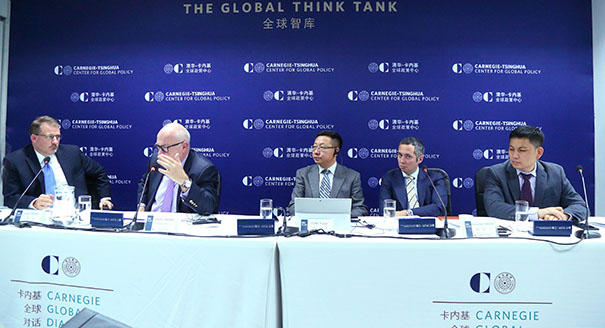Registration
You will receive an email confirming your registration.
The U.S.-Russia bilateral relationship is facing unprecedented strains. At the same time, the U.S.-China relationship is growing increasingly contentious over what the Trump administration views as the lack of reciprocity across many areas, including trade, investment, media, education, and culture. In parallel, ties between Russia and China are deepening—China participated in the Vostok 2018 war games and President Xi Jinping met with President Vladimir Putin at the Eastern Economic Forum. How will China’s strained relations with the United States and stronger cooperation with Russia impact how it positions itself in the global order? How should the United States react and respond to warming China-Russia ties? Are there U.S. policies that are working to push Russia and China closer together?
Carnegie–Tsinghua Director Paul Haenle moderated a discussion between scholars from the Carnegie Moscow Center and Fudan University that examined the Trump administration’s Russia and China policies and how they could have an impact on the relationship between the two major U.S. geopolitical competitors.
This panel was the first of the Carnegie Global Dialogue Series 2018-2019 and was cosponsored by Fudan University’s Center for Russia and Central Asia Studies.
This event was off the record.
DISCUSSION HIGHLIGHTS
- Russia’s Pivot to Itself: The discussants argued that combating economic pressure from the West has become one of Russia’s foreign policy focuses since its relations with the United States and Europe started deteriorating several years ago. They also said that Russia’s main priorities are to protect its turf and assert itself as a global power, as evidenced by its annexation of Crimea and large role in the Syrian conflict. These aggressive maneuvers show Russia’s desire to be recognized as a great power by the U.S. and Europe, as well as the greater international community. Russia continues to disengage from the West, but the economic consequences from that strategy and sanctions have not yet led to political changes.
Outdated Alliances: The panelists agreed that the concept of alliances is outdated, and that China-Russia relations can be conducted at the level of “strategic partnership” or, as one discussant said, an “entente.” Rather than sharing a common enemy, both China and Russia would welcome the opportunity to improve relations with the United States if it were to arise. Where China and Russia disagree is in their regional and global interests. Whereas China wants to expand its influence in South and Southeast Asia, Russia has recently sold weapons to India and continues to cooperate with Vietnam with regard to the South China Sea. Due to their different geopolitical aims, it is highly unlikely that China and Russia would band together and commit to mutual security guarantees.
Superpowers Cannot Get Too Close: Given that the Sino-Soviet split concluded in the mid-1960s, the panelists pointed out that normalization of China-Russia relations was a long time coming. The great powers share a border, are sympathetic to each other’s values, and fear both counterrevolution and democracy promotion efforts. China and Russia also learn from each other, as China’s NGO law mirrors that of Russia, and the two countries often vote together on issues in the UN. The panelists agreed, however, that the two can only get so close, as Russia depends on China much more than China on Russia. One panelist pointed out that China is a “big economic animal” and that Russia could never produce enough commodities to make up for what China is losing in the current trade war with the United States.
The U.S. Role in Warming China-Russia Relations: The panelists agreed that one of the factors driving Russia and China closer is their respective suspicion about U.S. long-term intentions. In addition, the United States considers China and Russia geopolitical competitors and has accused both countries of interfering in its internal affairs. It is only natural, then, that Russia and China would look to bolster their ties in the face such pressure from the United States. Some of the discussants, however, stated that regardless of these difficulties, China and Russia would be willing to improve their respective bilateral relations with the United States under certain circumstances.
Impacts of Improving China-Russia Ties: Any impact on the United States from warming China-Russia ties would be direct yet small. The discussants stated that there is growing cooperation between China and Russia in the technology and intelligence spheres, which could negatively impact the United States. The worst scenario for the China-U.S.-Russia triangle would be a military conflict between two of the states which, as the panelists noted, is highly unlikely. Moreover, the U.S.-Russia crisis prevention mechanisms are strong due to good military leadership communication.
Paul Haenle
Paul Haenle holds the Maurice R. Greenberg Director’s Chair at the Carnegie–Tsinghua Center for Global Policy based at Tsinghua University in Beijing. His research focuses on Chinese foreign policy and U.S.-China relations.
Feng Yujun
Feng Yujun is vice dean of the Institute of International Studies at Fudan University and director of the institute’s Center for Russia and Central Asia Studies.
Dmitri Trenin
Dmitri Trenin is the director of the Carnegie Moscow Center and the chair of its Foreign and Security Policy Program.
Ma Bin
Ma Bin is assistant research fellow at the Center for Russia and Central Asia Studies and the Research Center for Shanghai Cooperation Organization, both at Fudan University.
Alexander Gabuev
Alexander Gabuev is a senior fellow and the chair of the Russia in the Asia-Pacific Program at the Carnegie Moscow Center.
